Whyalla steelworks chaos nothing new for administrator Mark Mentha
Mark Mentha triumphantly sold the Whyalla steelworks to Sanjeev Gupta back in 2017, after saving it from near collapse. Now he’s back to save the steel city once again.
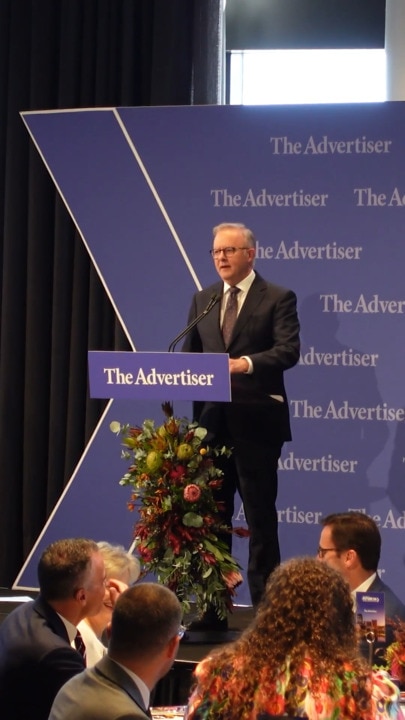
Administrator Mark Mentha is used to chaos. But there’s chaos, then there’s trying to keep a steel mill’s vital infrastructure from freezing solid in the middle of a statewide blackout with one working telephone at your disposal.
That was the situation which faced arguably Australia’s most esteemed administrator – think Ansett, Timbercorp and Griffin Coal – in 2016, when South Australia was plunged into darkness, as a combination of wild weather and a fragile electricity grid turned the lights off across the state.
Mr Mentha was running the Whyalla steelworks at the time, having taken over after Arrium collapsed with debts of more than $4bn, after an aggressive corporate debt bailout plan and a modest government bailout both failed to save the company from failure.
For a steelworks, a lack of power is a nightmare scenario.
If steel hardens in the massive ladles used in the steelworks, they can be rendered useless, or at least terribly expensive to rectify.
But that’s not the only problem a lack of power presents.
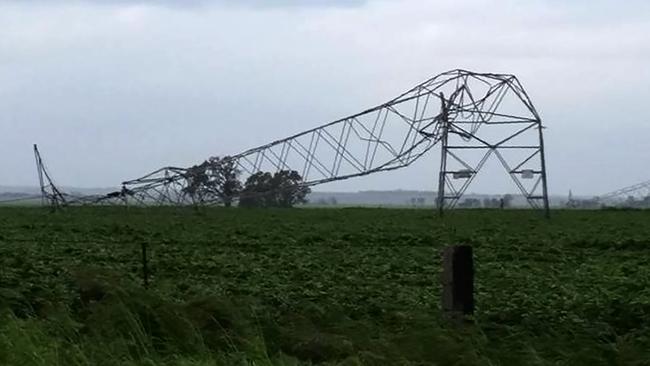
Without power, the iron ore slurry in the pipeline bringing the commodity from the mines in the Middleback Ranges to Whyalla would have hardened like concrete.
Both scenarios would have been an unmitigated disaster.
Mr Mentha told News Corp Australia at the time that it was like being on a war footing.
“I was in Whyalla and the sirens went off, the lights went off,” he said.
“It was around 20 past four in the afternoon, an overcast day given the wind and rain, and the look in everyone’s eye was fear because it was already one of the most dangerous work sites in Australia.
“We created a critical control room, pulled everyone together … people in ankle-deep water switching off electricity panels and control panels. We had to do all that in the dark.”
Even communications were difficult, with the blackout having taken out the site’s phone network.
“There was no power at all in Whyalla – we had one phone that worked, we had everyone driving around trying to charge their (phone) batteries, we had some walkie talkies, but very few because you live for mobile technology today.
“The problems just kept coming. Every time we found a solution there was another problem to address.”
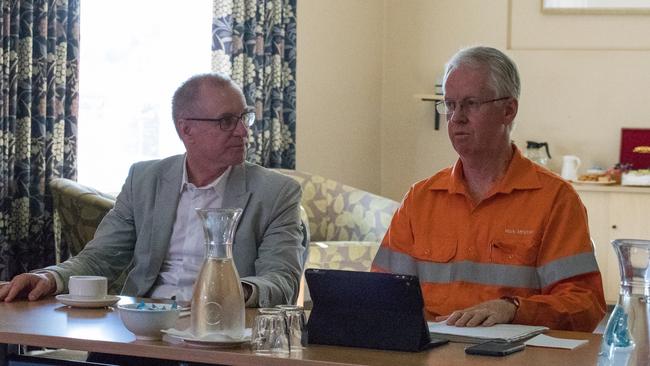
That comment could well be applied to the steelworks itself, going back over the past 15 years.
Mr Mentha and fellow partners at his firm KordaMentha were this week appointed for the second time to resurrect and sell the steelworks.
The first time it was run into the ground by ASX-listed firm Arrium, which crashed under a mountain of debt amid allegations of mismanagement and overspending, in particular for the Southern Iron mine, which was bought near the top of the commodity cycle and mothballed soon after.
Arrium tried desperately to survive, announcing a $754m capital raise in September 2014 to pay down debt at 48c per share.
The stock plunged to a 12-month low of 39c after the deeply discounted capital raising was announced, down from a high of $1.62 in February 2014.
In early 2016, struggling to stay afloat by this time, by now under an even larger debt burden, Arrium struck a billion dollar funding deal with GSO Capital Partners, a division of Blackstone.
That deal would have provided up to $US927m in funding to Arrium, to be used to help turn around the steel and mining arms.
In return GSO will be given share warrants – basically free share rights – which would have been equivalent to 15 per cent of the company.
GSO would also have had security over the assets of Arrium, and could further increase its stake in the company by underwriting a planned $US262m share rights issue.
The deal, carrying interest rates of 8-12 per cent, would likely have handed control of the company to GSO in the event of a default.
At the time Arrium’s shares were trading at just 2c, valuing the company at $44m.
Arrium’s bankers rejected the deal however, and the board soon tipped the company into the arms of administrators Grant Thornton, who were replaced at the behest of the banks by KordaMentha.
The firm negotiated a deal with the workers at the steelworks to take a 10 per cent pay cut, and sold off the profitable grinding materials business Moly-Cop for $US1.23bn.
Then, having survived the near-death experience of the statewide blackout, came the announcement, after much speculation, that a Korean consortium, involving massive conglomerate Posco and partners Newlake Alliance Management and JB Asset Management had won the bidding war for the steelworks, 14 months after it was placed in administration.
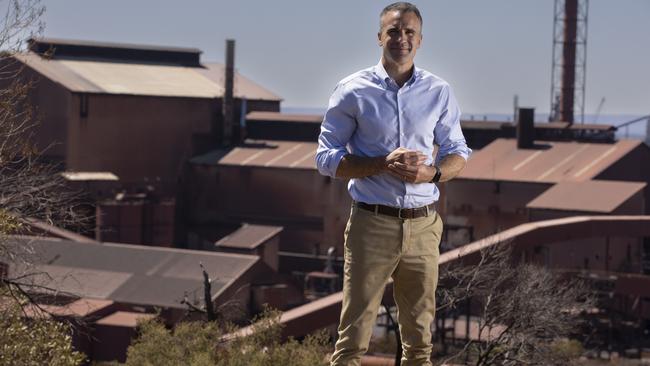
The group planned to upgrade Whyalla to include Posco’s Finex steelmaking technology and a gas power plant. The Finex technology was touted as a cheaper and cleaner type of steelmaking compared to the existing configuration of the Whyalla mill.
“After a 14-month administration and a nine-month sale process, we are now an important step closer to providing certainty to employees, creditors, suppliers, customers and the Whyalla community,” KordaMentha partner Mark Mentha said at the time.
“We thank all those people for their patience and support during one of Australia’s most complex administrations.”
But GFG Alliance boss Sanjeev Gupta was not yet out of the race.
It’s understood that financing issues arose with the Korean consortium, and a deal couldn’t be done within the exclusivity period.
“My first reaction was shock and horror,” Mr Gupta said of the moment he learnt GFG had missed out on preferred bidder status.
“We were so, so confident about our proposition and the fact it was superior. We were overconfident, which was our failing and why we suffered that hiccup.”
Mr Gupta upped his bid to a rumoured $700m, and eventually won the day.
“When that announcement went against us, it was unexpected, but we were still very confident that our position was the best one, so we fought back as hard as we could,” he said.
“Now it’s a beginning of a journey, that’s what’s exciting. There’s a lot of opportunities in Whyalla,’’ he said back in 2017.
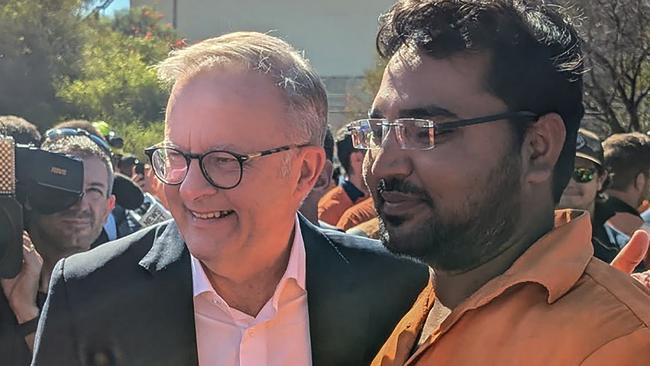
Mr Mentha at the time told News Corp Australia the outcome was an “11 out of 10”.
“There was relief when the final sale documents were signed (on Thursday) and now that feeling has shifted to a general sense of excitement. It’s a fantastic outcome,’’ he said.
History has not been kind to that assessment.
Mr Gupta, once dubbed Whyalla’s saviour, held his “big reveal” in the city in late 2018, promising billions in new investment across a new steel mill and massive amounts of renewables.
The promises kept coming, with a copper smelter, gigawatts worth of renewables projects, a bank, and even a return of car manufacturing to South Australia promised.
Of course none of that has come to pass. While Mr Gupta’s GFG Alliance did bring the steelworks back to profitability in 2020, his group has been bedevilled by the collapse of financier Greensill in 2021 which left it with a $US5bn debt burden, a number of civil court actions and an ongoing criminal investigation in the UK.
There has also been anger about cash generated in the Australian businesses, including the Tahmoor coal mine in NSW, being sent offshore to allegedly prop up the wider group.
GFG denies any wrongdoing, while the UK’s Serious Fraud Office continues to investigate the group over suspected fraud, fraudulent trading and money laundering.
Mr Gupta’s purchase of a $34m Sydney harbourside mansion and $12.5m Sydney apartment did nothing to win him any friends either, although he trenchantly refused to connect the dots between his own personal finances and those of his businesses, saying his private life was separate to his business dealings on a number of occasions.
The South Australian state government, itself owed tens of millions of dollars in royalties and unpaid water rates, ran out of patience this week, and passed emergency legislation allowing it to once again tip the steelworks into administration, forcing Mr Gupta out, and bringing Mr Mentha back in.
Arguably no one is better placed to do the job once more, and with the state and federal governments willing to tip in $1.9bn over the longer term to future-proof the steelworks, any potential deal has a significant sweetener attached.
Workers will hope it will stick this time.






To join the conversation, please log in. Don't have an account? Register
Join the conversation, you are commenting as Logout